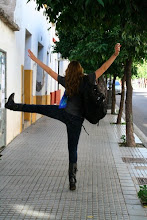Hesitancy in accepting the reality of events is the very reaction that fantastic literature, including magical realism, induces in its readers, who always act as secondary witnesses of sorts. This response should not be understood so much as an unwillingness to acknowledge the “poetic singularity” of the event, but as a readiness to keep an open mind toward several—often even contradictory—ways of perceiving and understanding.
--From “Writing the Vanishing Real: Hyperreality and Magical Realism” by Eugene L. Arva
For one thing, this annotated bibliography has also helped to clear up the idea of what exactly IS magical realism. It has helped me to take this big idea and contain it. This particular quote that I found while reading summed up how I felt when I was reading Leyendas. And I can say that I definitely felt that there wasn’t one single way at approaching the book, and more than anything maybe all I needed to do was to relax and adjust to being unsure of how to interpret the text. I highly recommend Arva’s article, too, especially if you’re feeling like you need a different approach towards the concept of magical realism. For example, I found it really interesting in the way that Arva used Guy Debord’s The Society of the Spectacle to help to explain magical realism. It also really gave me a better understanding of the purpose and the advantages of the use of magical realism in literature as a means of representing reality.
Another thing I’d like to add that I found very helpful, was the distinction between lo real maravilloso and realismo mágico. As a note, I feel that it’s pretty obvious after having read Carpentier’s preface to El Reino de este Mundo, however this article put it plain and simple:
…realismo mágico has a more universal connotation while Carpentier's lo real maravilloso is more criollista in the sense that it is magical realism that pertains solely to America.
-- From “Realismo Magico: True Realism with a Pinch of Magic” by Lee A. Daniel
So as skeptical as I was of this class in the beginning, I think that this Wikipedia project is filling in any existing gaps that I had (or that I felt that I had) with the readings. The research component paired with the examination of magical realist works first hand is shaping up to provide a very comprehensive coverage of the topic of literary magical realism in Latin America.
Subscribe to:
Post Comments (Atom)

No comments:
Post a Comment